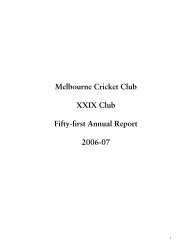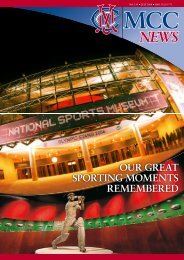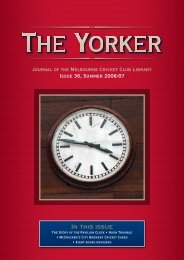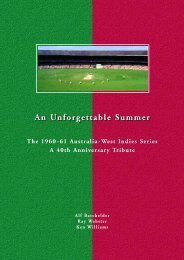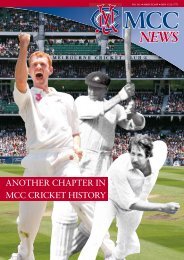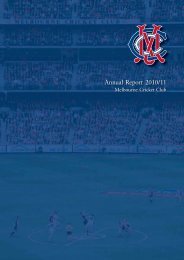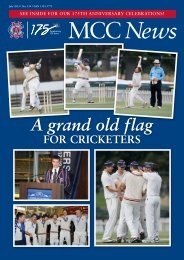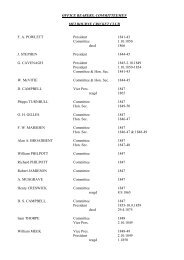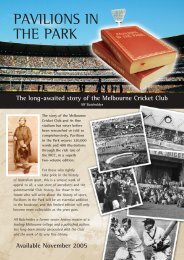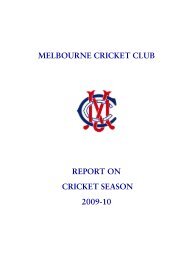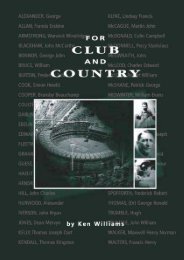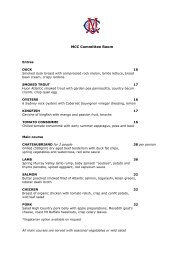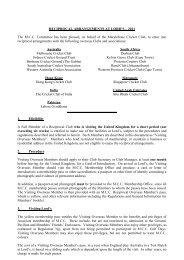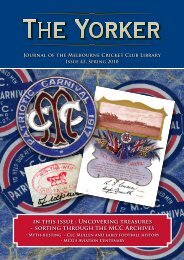Celebrating 175 years - Melbourne Cricket Club
Celebrating 175 years - Melbourne Cricket Club
Celebrating 175 years - Melbourne Cricket Club
You also want an ePaper? Increase the reach of your titles
YUMPU automatically turns print PDFs into web optimized ePapers that Google loves.
FUNCTION NEWS<br />
ABOVE: MCC president Paul Sheahan (right) and committeeman Charles Sitch (left) with<br />
Colonel Marcus Fielding, guest speaker at a club function held in November to mark the 70th<br />
anniversary of the MCG’s occupation by US forces.<br />
MCG’s military<br />
ties remembered<br />
on Thanksgiving<br />
The MCG has long had a connection<br />
with the armed forces, initially hosting<br />
matches against soldiers stationed in<br />
the new colony and staging military concerts<br />
there.<br />
Later, the ground was the venue for<br />
conscription rallies during the First World<br />
War and as the site of Victoria’s first war<br />
memorial, erected in Yarra Park in 1917.<br />
But that was small beer compared with the<br />
impact on the ground when it was<br />
commandeered as a military base for four<br />
<strong>years</strong> from 1942 to 1946 when more than<br />
200,000 Australian and American servicemen<br />
were billetted there.<br />
Such an epic period was worthy of<br />
remembrance and through the agency of<br />
MCC committeeman Charles Sitch a Long<br />
Room dinner was arranged on Thanksgiving<br />
– November 22 – to mark the 70th<br />
anniversary of the ground’s occupation by US<br />
forces.<br />
Some atmospherics were provided by the<br />
MCC Library which mounted displays from<br />
the Bob Shields Collection of wartime<br />
photographs and material from the family of<br />
Colonel W.H. Murphy, the man responsible<br />
for the MCG being known as Camp Murphy<br />
when personnel from the United States Army<br />
Air Forces were in residence in 1942.<br />
Guest speaker was Colonel Marcus<br />
Fielding, president of Military History and<br />
Heritage Victoria and author of Red Zone<br />
Baghdad, an account of his experiences in<br />
Iraq in 2008.<br />
The subject of Colonel Fielding’s address<br />
was the US victory on Guadalcanal in the<br />
Solomon Islands where, despite being<br />
undermanned and suffering heavy casualties<br />
at the hands of the Japanese, the Americans<br />
inflicted one of the first and most decisive<br />
reverses in the Pacific theatre.<br />
On December 9, the battle-weary men of<br />
the 1st Marine Division were pulled out of the<br />
action and sent to <strong>Melbourne</strong> for R&R,<br />
arriving at the MCG in January 1943. They<br />
enjoyed tremendous hospitality in “the best<br />
liberty port in the world” and forged lasting<br />
relationships with many local families.<br />
A flag flown by the US Marines on<br />
Guadalcanal eventually found its way to the<br />
club in 2004 and is on display in the MCC<br />
Museum.<br />
MCG captures the<br />
Australian spirit<br />
Les Carlyon had the audience in the<br />
palm of his hand right from the<br />
start. “I can’t think of a more<br />
appropriate place to celebrate Australia<br />
Day than the MCG,” said the<br />
distinguished journalist and author who<br />
was guest speaker at a Long Room<br />
luncheon on January 26.<br />
After reciting a list of famous names to<br />
have appeared at the ground over the<br />
<strong>years</strong>, the former Herald Sun editor-inchief<br />
and author of Gallipoli, The Great<br />
War and Master, a personal portrait of<br />
Bart Cummings, noted that the MCG “has<br />
always been an egalitarian place.”<br />
“Everyone comes here in good times<br />
and bad and everyone has memories of it.<br />
It links one generation to another…..and<br />
not many places capture so well what we<br />
can call the Australian spirit.”<br />
Like most who are masters of their<br />
craft, the Carlyon delivery seemed<br />
effortless with short, evocative words,<br />
clear of meaning and often recalling the<br />
pre-federation era that he thought<br />
fashioned the Aussie character. It was<br />
good, strong think music without any<br />
violins or flag waving.<br />
He spoke of bedrock values that were<br />
rooted in the 19th century and how we<br />
took the best parts of British law pre-1901<br />
and made positive amendments that<br />
reflected our view of things. “Ahead of<br />
most, we gave women the vote, paid our<br />
parliamentarians and established a<br />
minimum wage, radical stuff in those days.<br />
“We were ahead of the world in social<br />
welfare and we developed an appreciation<br />
of the self-made man, and of a classless<br />
society. Australians are very good at<br />
looking after each other and this is how<br />
the term mateship evolved.”<br />
He said what makes Australia great is<br />
its mix of the old and the new. “We should<br />
celebrate today’s heroes but don’t forget<br />
the great people of yesterday.”<br />
Carlyon’s inspiring address was<br />
preceded by some brilliant entertainment<br />
from tenor Robert Barbaro and pianist<br />
Amir Farid, testimony to the high quality of<br />
this annual luncheon that has been a<br />
worthy initiative of the MCC guides group.<br />
March 2013<br />
MCC NEWS<br />
17



